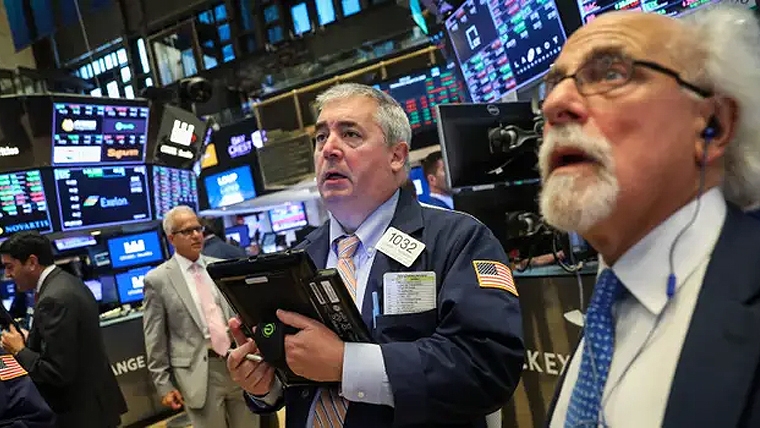
While many Americans and US allies recoil at the accelerating regime change under President Donald Trump, financial markets remain curiously calm. Equity indices continue to hover near record highs, and serenity prevails in the bond market – traditionally the stern disciplinarian of fiscal and political excess.
This mood contrasts starkly with the response following Trump’s tariff announcements in April, when yields on US Treasury bonds spiked, forcing the administration to backtrack. At the time, bond investors appeared willing to serve as a check on bad economic policies. Yet now, despite the systematic erosion of the country’s long-term capacity to create wealth – which stems from its world-class universities, scientific leadership, openness to foreign talent, and the rule of law – bond markets (and investors generally) seem to have fallen asleep at the wheel.
What changed? The prevailing explanation is that markets simply do not believe that Trump’s most disruptive policies will endure. Bond traders may assume that institutions will constrain executive overreach, that the courts will intervene, or that a political backlash will eventually soften the most extreme measures.
But this complacency raises a deeper puzzle. Why should sophisticated, forward-looking bond investors – arguably the world’s best risk managers – take such chances? Hedging for the possibility that bad economic policies will stick would seem to be the rational thing to do, because the long-term costs of being wrong could be enormous. These would include not only higher risk premia, owing to higher inflation and currency instability, but also weakened confidence in US Treasuries as the global safe asset.
Yet bond investors appear content to keep funding the US government at historically low yields, while using this cheap leverage to chase equity gains. Of course, the strategy makes sense in the short run, because equities continue to benefit from tax cuts, deregulation, and an administration eager to prop up risky asset prices. As long as Treasury yields remain subdued, leveraged strategies will flourish. By borrowing cheaply in bond markets and plowing funds into equities, you can deliver stellar returns.
In other words, complacency is not a misperception but a preference. Bond markets may understand the risks perfectly well, but they are choosing to ignore them, because the payoff structure rewards short-term momentum over long-term prudence. This dynamic is reminiscent of the run-up to the 2008 financial crisis, when mortgage risks were acknowledged but brushed aside as long as securitisation kept delivering profits (never mind that it was all backed by toxic housing assets).
Moreover, bond markets do get things right in general. When everyone was debating the reasons for the 2021 inflation and critiquing the US Federal Reserve, bond markets always understood that inflation was due to a combination of pandemic-led demand and supply shocks that would prove transitory. That is why long-run inflation expectations never moved. Now, the same bond markets are predicting accelerating inflation over the next two years, with the two-year breakeven rate exceeding 3% (the current rate of CPI inflation).
In other words, bond markets are predicting some risk in the short run and ignoring long-run risk. It is business as usual: maximise profit and try to navigate policy risk.
Even before the last election, in August 2024, Citi’s global head of FX quantitative investor solutions, Kristjan Kasikov, pointed out that risks linked to monetary policy in Japan could fuel risk appetite. Hedge funds had begun to favour the dollar over the yen as their funding currency for placing bets on everything from Brazilian assets to Nvidia shares. So, we should not be surprised when investors behave in a similar manner in response to US policy risk.
Besides, Trump’s economic adviser Stephen Miran, who now sits on the Fed board, has said that even though tariffs will cause the dollar to appreciate, the US can offset this effect. Under the circumstances, investors are not irrational to assume that this policy environment will remain profitable as long as they raise funds in the riskless US bond market and invest in risky assets.
The problem, of course, is that the US bond market will be riskless only until it isn’t. The trillion-dollar question is who will be first to demand higher risk premia to hold US bonds. While many foreign central banks and sovereign funds continue to hold large Treasury portfolios, they also have started diversifying into gold, the euro, or other safe assets.
America’s ability to fund its deficits cheaply is not a birthright; it is earned through trust in its institutions, and that trust is fraying. After that first bondholder demands a higher premium to hold Treasuries, the situation could change fast. What will the US do when a critical mass of bondholders decide that the profits from investing in risky assets are no longer enough to justify refraining from demanding higher risk premia?
Viewed in these terms, the bond market’s silence is not reassuring; it is alarming. The implication is that investors are whistling past the graveyard, betting that someone else will move first. But by the time the alarm bells ring, it will be too late for an orderly adjustment.
Financial-market participants pride themselves on being forward-looking. Yet today, as America’s institutional foundations wobble, and as the administration pursues one bad policy after another, bond investors appear dangerously myopic. They prefer to ignore the risk because complacency pays. And it will continue to pay – until it doesn’t.
Şebnem Kalemli-Özcan, Professor of Economics at Brown University and Director of the Global Linkages Lab, is a former senior policy adviser at the International Monetary Fund and former lead economist for the Middle East and North Africa at the World Bank. This content is © Project Syndicate, 2025, and is here with permission.

We welcome your comments below. If you are not already registered, please register to comment
Remember we welcome robust, respectful and insightful debate. We don't welcome abusive or defamatory comments and will de-register those repeatedly making such comments. Our current comment policy is here.